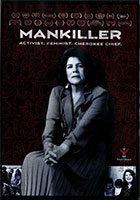
Mankiller 2017
Distributed by Good Docs
Produced by Valerie Red-Horse Mohl, Stacy Mahoney, Charlie Soap, Kristina Kiehl
Directed by Valerie Red-Horse Mohl
DVD , color, 57 min.
High School - General Adult
Feminism, Government, Native Americans, Politics, Social Movements
Date Entered: 06/11/2018
Reviewed by Elizabeth A. Novara, Curator, Historical Manuscripts, University of Maryland, College ParkThis engaging biopic tells the story of Wilma Pearl Mankiller, the first woman elected as Chief of the Cherokee Nation. The film begins with an overview of Mankiller’s early life – from the poverty of her childhood in rural Oklahoma, to her family’s forced relocation to San Francisco, to the social movements of the 1960s that influenced her political awakening, including the occupation of Alcatraz. Concerned about tribal sovereignty, land rights, social welfare, and other political issues, Mankiller returned to Oklahoma in 1977 and lived out of her car with her two daughters until she eventually found employment with the Cherokee Nation. She worked to improve impoverished local communities, such as improving health care and access to running water. As a liberal Democrat and as a woman, Mankiller faced political opposition and sexism, but she found herself elected as Deputy Chief in 1983 and then as Principal Chief shortly thereafter in 1985. The documentary deftly explains how she was able to build relationships and create successful community programs even with those who held vastly different political views. In addition, the film strikes a good balance between Mankiller’s personal life and her public life, showing how the personal is often inseparable from the political, and how Mankiller persevered through personal challenges.
Mankiller features interviews with and archival footage of important national and local activists, authors, historians, politicians, tribal members, and family members including Gloria Steinem, Roxanne Dunbar-Ortiz, Ross Swimmer, Bill Clinton, and Kimberly Teehee. The pace and overall storyline of the film are excellent, and the film persuasively demonstrates Mankiller’s nationally significant leadership and her indigenous feminism, by which she strove to bring Cherokee cultural values and self-governance back to the Cherokee Nation. While the film primarily focuses on Mankiller, the history and beliefs of the Cherokee people are interweaved in the narrative, for example the Trail of Tears and other forced removals, the destruction of matrilineal cultural practices by European settlers and the U.S. government, and the persistence of community ties. Mankiller’s feminism is a central theme throughout the film, such as her community-focused policies and practices and her support for and mentorship of Cherokee women leaders.
Mankiller is an essential documentary for classes or library collections related to American women’s history, Native American history and culture, and political history, and has been featured on PBS stations.
Awards